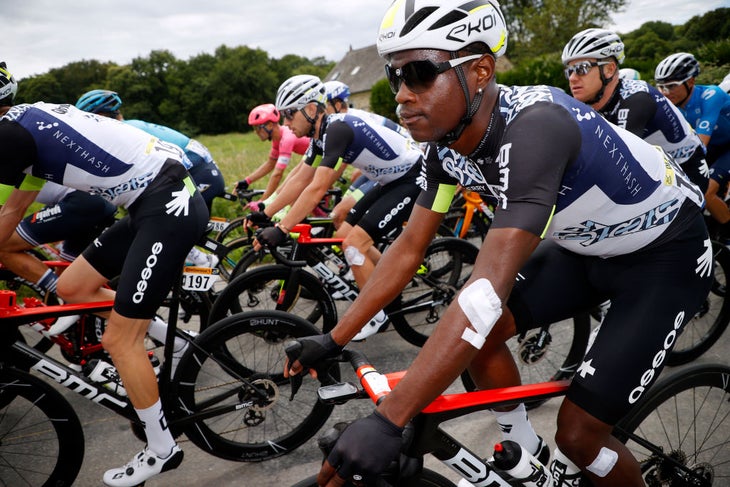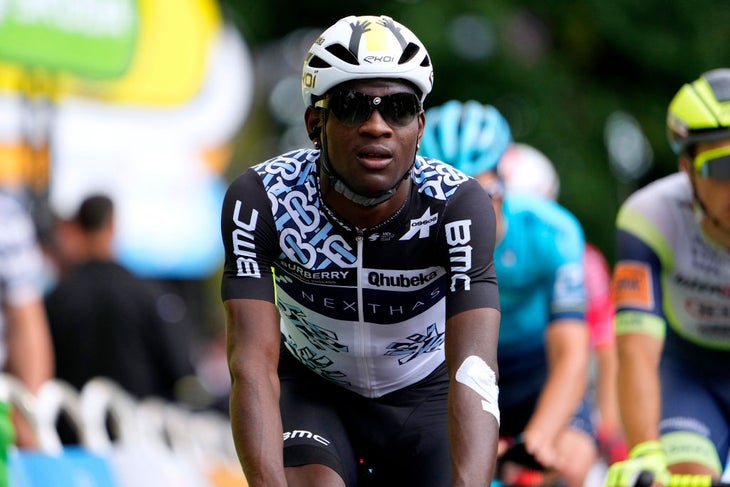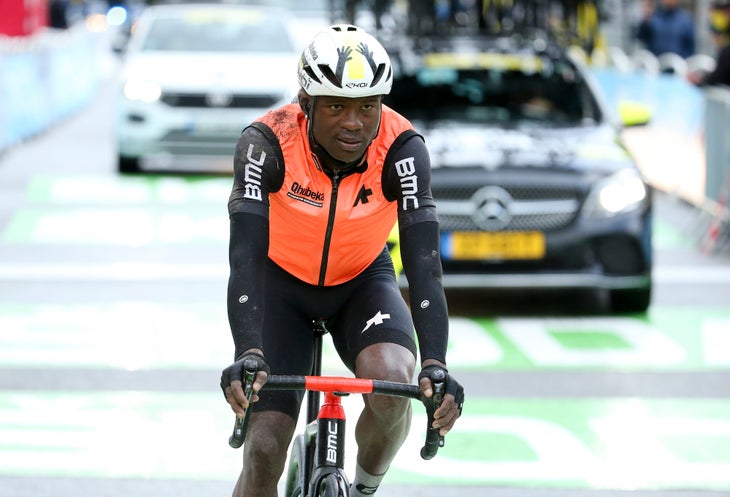TIGNES, France (VN) — There was no way Nicholas Dlamini was going to step off.
The 25-year-old Qhubeka-Nexthash trailblazer had come too far and sacrificed too much to quit. A slip of the wheel coming down the rain-slicked Cornet de Roselend in Sunday’s ninth stage saw South Africa’s first Black rider to race the Tour de France slam to the ground.
Shaken but not broken, Dlamini did what he’s always done against adversity — get back on the bike and keep pushing.
“Just getting off my bike and getting into a car wouldn’t have been an option,” Dlamini said Sunday. “This is a race I wanted to honor, and honor my dream.”
Also read: Dlamini makes history at Tour de France
Dreams can come true, and Dlamini proved it every day during the 2021 Tour.
And even if he was hors délai in Sunday’s grueling stage across the French Alps, there was no way he was going to quit. Despite losing contact with the peloton, Dlamini rode alone and finished nearly 1 hour and 30 minutes behind the winner.
“It is sad to finish the Tour this way, but the most important thing was to not to stop and ride to the finish regardless of being outside the time limit,” he recounted. “I honored the dream.”
For Dlamini, who made it out of one of South Africa’s most notorious townships to the highest summits of professional racing, finishing on his terms was the only way.
Making history and breaking barriers

And there was no way he was going to step off.
That would be the wrong signal to everyone who’s cheered him, supported him, and gave him opportunities in his remarkable personal journey from South Africa to the 2021 Tour.
“It would have been easier to get into a team car,” Dlamini said Monday. “I wanted to respect the sport and respect my team as well, and honor my dream to try to finish the race at least, even if I was out of the time limit. I am glad I finished, even if it was an hour and a half behind the winner.”
Dlamini made history throughout the 2021 Tour de France, and though his race ended with an emotional farewell Sunday, he’ll leave a mark that extends well beyond the French Alps.
Alone on the wet roads, banged up and bruised, Dlamini simply refused to quit.
https://twitter.com/friebos/status/1411732562855276552
Nearly one and a half hours after Ben O’Connor (Ag2r-Citroën) won the stage, Dlamini crossed the line to rousing cheers.
“When I was riding up alone, there were still a lot of people there and they were really cheering me on,” he said. “I was quite surprised to still see fans at the finish line because I think by the time I got up there it was nearly 7 o’clock. I thought they would be taking down the fences.”
His remarkable personal journey from the townships of South Africa to the marquee stage race in cycling wasn’t going to end in the broom wagon.
From township to the Tour de France

Every Tour de France rider brings their unique origin story.
Some are talent-hunted from nations with wealthy national budgets. Others are drawn into the sport from their family. Racing for Mathieu van der Poel literally runs in his DNA, with his father and grandfather both former Tour racers.
Some move across from other sports, like Michael Woods, who was a world-class middle-distance runner whose natural engine was perfect for pushing the watts.
For Dlamini, the bicycle was first an escape and passion long before it became a vocation.
“When I was growing up in the township, it was really hard,” Dlamini said. “It was just me and my mom and my sister. We didn’t have a car, so if we wanted to go anywhere, we had to walk.
“When I discovered the bike, it opened up the world to me,” he said. “I could to places that I would never have seen. The bicycle was really part of my backbone.”
’In the township itself … You'd be more respected for owning a gun or shooting someone.’ SA cyclist @nich_dlamini of @QhubekaAssos wants to change that with a good showing in the @LeTour.#TourDeFrance #TourDeFrance | @IOLsport https://t.co/5i8hH3kB7o
— IOL News (@IOL) June 27, 2021
Along with his twin sister, Dlamini started as a runner, and his prodigious nature engine saw him become a top local talent. His natural curiosity, however, led him to want to explore with a bike.
A group of friends would share one bike, with each taking turns with stints. With each trip, Dlamini would explore a little further, and soon he was hooked.
“You find one guy out of 15 has got a bike, and we always do turns on riding the bike, where one takes it up for a minute and it comes back, and another jumps on,” he said.
“Growing up in a township is never easy,” he said. “I would try cycling and see what I could discover. I could explore quite a lot and I guess that’s where the love of cycling grew. When I started when I was 14, I could only run 5km or 10km, and with the bicycle I could do 100km, I could see the whole of Cape Town.”
Dlamini and his amazing backstory — that included stints at the World Cycling Centre and a pro contract in 2018 — made him a media darling at the 2021 Tour.
Cyclist Dlamini suffers broken arm in Table Mountain ticket row https://t.co/X1CeM9oiiy pic.twitter.com/XoP5kRnDHs
— Jacaranda News (@JacaNews) December 28, 2019
In 2019, Dlamini was in the headlines when park rangers at a national park outside of Cape Town roughed him up and even broke his arm when they jerked it violently behind his back. A video of the incident went viral, and Dlamini was forced to undergo surgery.
“Luckily, with COVID, it gave me more to time to recover,” he said. “Shocked? I don’t know, to be honest, it was mixed feelings, maybe a bit of shocked and maybe not shocked, because I grew up in a township, so I’ve seen worse.”
Dlamini doesn’t forget his roots. He described his home life full of love, but life in the township was hard. He said it was often choosing between “guns and gangsters,” and he chose sport and education.
He’s active in the Qhubeka Foundation’s work to share bicycles with local communities, and works with cycling clubs back home.
“I’ve been fortunate enough to be present in a lot of bike handovers, and they are all special,” he said. “For the kids, it is a life-changing experience for them. They have never touched a bike or owned a bike, so to actually be given a bike and ride is really special. When you see their smiles, everything is worth it.”
Dlamini was in demand during the Tour. Major news channels did features on his historic start, including profiles on NBC and CNN.
Decked out in his team’s distinctive jersey, Dlamini would patiently answer questions from curious journalists every morning. Not only was he the only Black South African in the race, he was the only person of color in the entire Tour peloton.
“It doesn’t really bother me,” when asked if he was growing weary of questions about possible racism . “You know it’s something that is there, and people can see these things.
“Obviously, we would like to do more, to make sure that there is no such thing as racism. But from a personal perspective, I think I’ve been lucky enough to have not experienced any of it.”
Determined to return to the Tour de France

There have been plenty of South African riders in the Tour, from Daryl Impey to Robbie Hunter to Chris Froome, who spent part of his childhood in South Africa, but Dlamini was the first from the majority Black community to race in cycling’s most important stage race.
After a taste of the Tour, he wants to come back for more.
“I’m really excited to come back and finishing the job,” he said. “It’s been an incredible two weeks, and considering where I come from, coming here as a first Black South African has changed a lot of people and inspired a lot of people in South Africa and internationally, I am happy to be the person to be granted this opportunity.”
Dlamini already raced two editions of the Vuelta a España, and won the King of the Mountains jersey at the Tour of Britain. Though he’s still not hit the winner’s podium, steady progress in three years as a pro let him punch his Tour ticket in 2021.
While some professional cyclists are reticent about speaking about issues of race or other sensitive topics, Dlamini embraces the opportunity to be a role model.
Dlamini spoke to journalists Monday afternoon via a Zoom call. Up next are a call up to the Olympic Games and races later in the season. He’ll return to his European home base in Girona, Spain, to be with his wife and newborn son.
“Yes, it’s been an incredible journey,” Dlamini said. “It’s an eye opener, you know, from the background I’m coming from all the way to the Tour de France.”
“I hope it doesn’t stop from here and inspire a lot of youngsters in Africa to keep dreaming, and not holding back on their dreams,” he said.
“I would have loved to get to Paris, especially because this year’s Tour finishes on Champs on Nelson Mandela Day, and it’s a special day for South Africa,” he said. “I’ve wanted to become a role model that leads by example. What I did yesterday really helped me by leading by a good example to the kids back home. They could see that giving up is not really an option, you have to keep going.
“I do look forward coming back to the Tour de France, it is a lovely race.”
